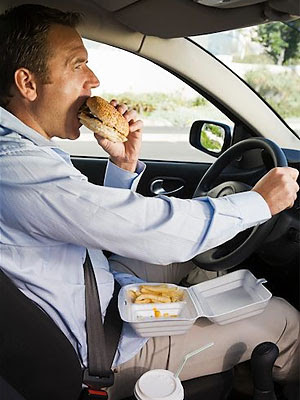No matter how serious you are about watching your
weight,
practicing portion control, and maintaining good eating habits, it’s
easy to find yourself in certain situations that can really test your
willpower. Here are some common “danger zones” to watch out for when
you’re trying to stick to a healthy, low-calorie eating plan. It’s
important to know your overeating triggers because then you can plan
ahead and deal with the situation, says Marjorie Nolan, RD, a national
spokeswoman for the American Dietetic Association and a nutrition and
fitness consultant in private practice in New York City.
Feeding in Front of the TV
The problem with
eating
in front of the TV is that you’re not giving your meal or snack your
full attention. Realistically, though, if you’re alone, you might want
the TV for company. “If you are going to watch TV and eat, prepare your
meal fully and portion it out,” Nolan says. Once you’ve eaten what’s on
your plate, stop. Also, give yourself a set time frame. Eat during just
one half-hour show and not all night with the TV on.
Overboard at the Buffet
Here’s a way to approach the buffet table without overeating: Fill up one plate with small
portions
and stop. Practice portion control by taking less of the unhealthy
choices. Another trick: Make several trips, but limit yourself to one
food group each time. For example, start with portions of vegetables, go
for protein the next time, and carbs last. “Filling up your plate
according to food groups helps you be more in control and have a sense
of what you’re eating,” Nolan says.
Weekend Indulgences
“We always talk about how not to overeat
at the party,” Nolan says. But the day after can be just as challenging.
People rationalize by saying, “I’m already overeating, so I’ll wait
until Monday to resume my good eating habits.” It’s fine to overindulge
for an evening, but start back on your eating plan with portion control
immediately afterward. You’ll only make it worse if you continue
overeating. “It needs to stay just at that party or evening,” Nolan,says “Give yourself a specific time frame.”
Dining-Out Diet Disasters
Never arrive at the table famished. It’s
really hard to maintain good eating habits and have portion control when
you’re starved. To avoid overeating, have a few carrots or almonds
before you leave to meet your friends. If you’re drinking
alcohol,
limit yourself to two drinks at most to save on calories and keep from
getting inebriated and losing your self-control. Another tip: Space your
two drinks at least an hour apart. That way you won’t feel deprived,
Nolan says.
Vacation Eating
A good way to avoid overeating while on
vacation
is to decide each morning which of your three meals will be your
special one. “Keep it to one indulgent meal a day, not three,” Nolan
says. One day it might be breakfast, the next dinner. Having one meal a
day that is beyond your normal eating habits and higher in calories is
fine as long as you’re not doing this all day. If you want dessert,
share the portion with fellow vacationers.
Meals on the Go
Pack healthy meals and exert portion control on
snacks
for when you’re traveling. “I rarely leave it up to the gods where I
eat when I’m on the road because you never know what they’re going to
have,” Nolan says. “If you pack non-perishables and don’t eat them
because you found a good restaurant, you can save them, and you’re not
wasting.” Portion your snacks in individual baggies. If you must take
the original bag, include a measuring tool so you can eat the right
portions.
Emotional Snacking
Some people find themselves overeating
when they’re upset or under stress. If you’re having an emotional time,
the solution is to be conscious of how your eating habits are being
affected. Keep a
food journal
to help you see the portion sizes you’re eating. Another trick is to do
something fun that doesn’t involve food to distract you from your
worries. Get your nails done. Call a friend you haven’t seen in a while
and have a long chat. Take a hike. Ride a bike.
Eating on the Job
When you’re really busy at work, you tend
to eat quickly and not pay attention to portions or calories. Again,
the answer to portion control is to plan ahead.
Pack lunches
and snacks the night before that will fill you up during the day. You
won’t have to run to the convenience store around the corner and grab
the first thing you see or risk overeating. Also, force yourself to stop
work for just 15 minutes to eat. You need the break, and you’ll feel
fuller if you take time out to eat.
Sleep-Induced Hunger
When you’re overtired, it’s easy to eat mindlessly and before you know it, you’re overeating 1,000 extra
calories.
One solution is to take a nap rather than reach for another portion of
peanut butter cookies. If it’s late at night and you’re about to start
overeating, go to bed rather instead of wandering into the kitchen.

No comments:
Post a Comment